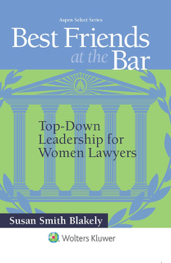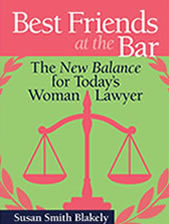In the PM session of the NAWL Mid-Year Meeting last week, the subject was “Power — How to Get It and How to Use It.” The topic was set against the background that striving for power is not traditionally what nice girls do. The consensus of the panel discussion was that we need to put an end to that myth!
That conclusion takes on added significance and gravitas when you consider that the panel was made up of a federal judge (Honorable Anna Blackburne-Rigsby, DC Court of Appeals), a law firm managing partner (Anastasia Kelly, Co-Managing Partner, DLA Piper LLP), and two general counsels (Kim Keenan, General Counsel of NAACP; and Denise Keane, General Counsel of Altria). The panelists were joined by Michele Roberts, Partner, Skadden Arps, who instantly became the moderator extraordinaire and remarkable role model for every woman litigator in the room. So what did this panel have to say?
The question out of the box was what does it mean to be powerful? Here are some of the nuggets from the panel:
- Being allowed to have your own voice, to speak up and to speak out. When you feel that you are not heard, you can perceive yourself as losing power. Don’t go there;
- Making good judgment calls, including recognizing the value of your hard work. Pronounce your opinions, do not question them;
- Being open-minded and brave enough to hear and consider contrary opinions and views;
- Owning your mistakes as well as your successes;
- Knowing when to be nurturing and when to be tough (women are particularly adept at this); and
- Asking for help when you need it —- just as you have to ask for work when you want it.
The follow-up question, of course, was how do you get power? Here are some of the answers:
- Make your own choices on what kind of power you want in both your professional life and your personal life. Don’t let others make those decisions for you. Consider your own personality, psyche and temperament and how it fits into the various leadership opportunities. Be yourself not someone else;
- Be independent and seize opportunities;
- Figure out who you want to be like and model that behavior;
- Make it known that you want more responsibility to demonstrate your competency;
- Actively seek out mentors and sponsors;
- Do not magnify and harp on your mistakes. If you make a mistake: Own it, fix it, and move on;
- Avoid excess emotion on the job. If you cry, make it clear that yours are tears of anger not tears of sadness or weakness;
- Understand that effective leadership is hard work and expect it to be. Effective leaders make it look effortless, but it is not; and
- Recognize the privilege that you have as a lawyer and as a woman in this country and in the world. Use your privileged status to improve the human condition. Women may have to work twice as hard to get power, but that will change as more women get it.
And, then came the age-old toughest question for women lawyers: What will it take to change law firms to create environments where more women can become leaders?
I was not surprised at the answers. Several years ago I was on an ABA panel, which had been designed around the Best Friends at the Bar project and addressed the same question. Here is how the NAWL panel answered that question:
- Clients will change law firms. It is the power of the purse. Clients will demand more diversity on their legal teams for the following reasons: Because it has been proven that diverse teams get better results; because clients want a continuing relationship with a firm that has institutional knowledge of the client and professionals that they value and trust (and losing talent is not consistent with that goal); and because, based on their own experiences in law firms, many female general counsels advocate for female and minority lawyers;
- Law firms can affect leadership and training opportunities for women lawyers by taking them on client pitches and letting them demonstrate their competencies with the clients. This is a commitment that must start at the top. If clients value contributions from the women lawyers, the road to partnership, management and leadership will be much easier;
- Accomplished women lawyers will have to “lean back” to recognize the talents of other women lawyers. Not enough women do it. Women need to find good practice opportunities for other women to enhance their skills; and
- Senior women must give constructive feedback to junior women in an attempt to teach them and to elevate them.
What a day! And there was more. Don’t miss the next NAWL Conference that comes your way! If such outstanding and accomplished panelists can take their time to discuss these important issues, so can you. Be there!
(But if you can’t make it, read the Best Friends at the Bar books. It is all in there, too!)












